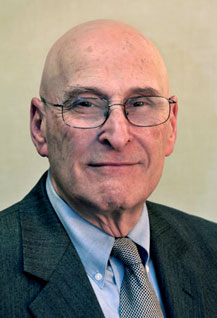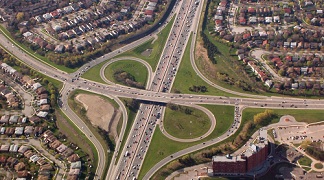Considering Transportation as a Complex Sociotechnical System
-
Dr. Joseph M. Sussman, JR East Professor in the Department of Civil and Environmental Engineering and the Engineering Systems Division at the Massachusetts Institute of Technology, presented “Considering Transportation as a Complex Sociotechnical System” on April 17, 2013, during a Volpe speaker series event.
About the Speaker
 Dr. Joseph M. Sussman is the JR East Professor (endowed by the East Japan Railway Company) in the Department of Civil and Environmental Engineering and the Engineering Systems Division at the Massachusetts Institute of Technology (MIT), where he has served as a faculty member for 43 years. He is the author of Introduction to Transportation Systems, a graduate text published in 2000, in use at a number of universities in the U.S. and abroad. It has been translated into Greek, Chinese, and Spanish. His book Perspectives on Intelligent Transportation Systems (ITS) was published in 2005.
Dr. Joseph M. Sussman is the JR East Professor (endowed by the East Japan Railway Company) in the Department of Civil and Environmental Engineering and the Engineering Systems Division at the Massachusetts Institute of Technology (MIT), where he has served as a faculty member for 43 years. He is the author of Introduction to Transportation Systems, a graduate text published in 2000, in use at a number of universities in the U.S. and abroad. It has been translated into Greek, Chinese, and Spanish. His book Perspectives on Intelligent Transportation Systems (ITS) was published in 2005.
Dr. Sussman received the Roy W. Crum Distinguished Service Award from TRB, its highest honor, “for significant contributions to research” in 2001, and the CUTC Award for Distinguished Contribution to University Transportation Education and Research from the Council of University Transportation Centers in 2003. In 2002, ITS Massachusetts named its annual “Joseph M. Sussman Leadership Award” in his honor. He became a fellow of the American Association for the Advancement of Science in 2007. In 2008, he won the Distinguished Alumnus Award from the School of Engineering Alumni of the City College of New York.
In 1997, Dr. Sussman won the Civil and Environmental Engineering Department’s Effective Teaching Award. In 2002, he won the Technology and Policy Student Society “Faculty Appreciation Award” for his design and teaching of a new required subject called Introduction to Technology and Policy. In 2009, Dr. Sussman won ESD’s Joseph A. Martore Excellence in Teaching Award.
In 2006, Dr. Sussman initiated the transportation systems focus area for the MIT-Portugal Program (MPP), a $40 million, 5-year program of education and research. His MPP work includes participation in the development and teaching of a new international MSc in transportation systems in collaboration with three Portuguese universities, and research in regional strategic transportation planning, intelligent transportation systems, and high-speed rail (HSR).
Dr. Sussman’s work in railroads goes back to the beginning of his faculty career. His initial research in the 1970s and 1980s in freight railroads focused on service reliability, rail operations, and maintenance. When he became the JR East Professor in 1991, he turned his attention to passenger rail and especially high-speed rail and risk assessment. Working with the Safety Research Lab at JR East, he led a major study in “global risk assessment” that subsequently guided safety investments on that railroad. He has had a major impact on the railroad industry in the U.S. and abroad, and has several prize-winning papers. He has worked with the Union Internationale des Chemins de Fer (UIC) on technology scanning for the international freight and passenger railroad industry. In Portugal, he is currently the principle investigator of the EXPRESS project examining many aspects of HSR planned for that nation, including megalopolis formation, financing of mega-projects, the financial “crowding-out” effects that may occur, air-HSR cooperation and competition, and urban issues related to HSR services. Further HSR work includes comparative studies of HSR productivity in various international setting, systems studies using the CLIOS Process (see next paragraph) of the Northeast Corridor in the U.S., economic growth, environmental tradeoffs in the deployment of HSR, urban implications of HSR deployment, and planning for high levels of uncertainty inherent in HSR.
Dr. Sussman focuses much attention on the study of “complex, large-scale, interconnected, open, sociotechnical” (CLIOS) systems, working in many applications areas, and has developed the CLIOS Process to study such systems. Dr. Sussman has worked recently on developing a new methodology for regional strategic transportation planning (RSTP) embedded in the CLIOS Process, integrating ideas from strategic management, scenario-building, and technology architectures, and applying it to applications in the U.S. and abroad. His work in this arena includes transportation, technology, and sustainability in Mexico City and Kuala Lumpur, Malaysia. Currently, he is applying these ideas in Portugal and the U.S.
He has worked extensively on intelligent transportation systems (ITS), helping to build the U.S. national program. While serving as the first Distinguished University Scholar at IVHS (now ITS) AMERICA (1991-92), he was the only academic member of the core group of five who wrote the first strategic plan for IVHS in the U.S., a 20-year plan for research, development, testing, and deployment, which has shaped the U.S. ITS program to the present day. He has worked on the development of an “intelligent corridor” in Bangkok; a comparison of ITS programs in Western Europe, Japan, and the U.S.; commercial vehicle operations; building regional ITS architectures in Massachusetts; emergency response and institutional issues concerning ITS; and the provision of “flexibility” in surface transportation through ITS technologies. He was the program chair of the ITS America Annual Meeting in 2000, served several terms on the ITS America board, and has conducted short courses in ITS for practicing professionals in the U. S. and abroad. Currently, he serves as the chairman of the ITS Program Advisory Committee—mandated by SAFETEA-LU—for the U.S. DOT, charged with advising the department on all facets of the ITS program.
Dr. Sussman chaired the TRB committee overseeing the Federal Railroad Administration’s R&D program from 1996 to 1999 and chaired, in 2006, a TRB panel reviewing the federal transportation strategic plan for R&D. Currently, Dr. Sussman chairs a new committee advising U.S. DOT on the next generation of its Research, Development, and Technology Strategic Plan (RD&T SP). Further, he chaired a TRB task force that produced a major TRB report entitled “Airport System Capacity — Strategic Choices” in 1990.
In February 2011, an NRC committee that he chaired wrote and released an NRC report entitled “Federal Funding of Transportation Improvements in Base Realignment and Closure (BRAC) Cases.” This report recommended a fundamental restructuring of the relationship between the Department of Defense and the civilian public sector with respect to how transportation programs are funded when there are substantial shifts of military personnel to bases in already congested areas.
He has worked on the application of computers to engineering problem solving, specializing in simulation methods and their application to the transportation field, and he contributed to the development of ICES (Integrated Civil Engineering System), among the most widely used computer systems in the engineering field. He has developed and taught undergraduate and graduate subjects in transportation, engineering systems, information systems, simulation methods, intelligent transportation systems, and technology and policy, and has written extensively on transportation education philosophy and program design. In 2008-09, he chaired the ESD committee that recommended a fundamental restructuring of the ESD PhD program. In the last several years, Dr. Sussman has devoted considerable attention to undergraduate education, teaching two required subjects in CEE, Project Evaluation and Engineering System Design. In ESD, he developed Introduction to Engineering Systems, a freshman/sophomore class being taught for the first time in spring 2011. This class is intended to broaden the ESD footprint with MIT undergraduates and is the precursor to more ambitious ESD plans in the undergraduate arena at MIT.
Dr. Sussman has served on review panels for transportation programs at Northwestern, the University of Toronto, Cornell, and the University of Michigan (chair). He currently serves as the chair of the CE advisory committee at CCNY and recently completed a 10-year stint on the advisory committee of Cal-IT2, a joint venture of UC-Irvine and UC-San Diego.
Dr. Sussman earned a BCE from City College of New York in 1961, an MSCE from the University of New Hampshire in 1963, and a PhD in Civil Engineering Systems from MIT in 1967. He joined the MIT faculty in 1967. From 1977 to 1979, Professor Sussman served as the Associate Dean of Engineering for Educational Programs. From 1980 to 1985, he served as head of the Department of Civil Engineering at MIT. From 1986 to 1991, he served as director of the Center for Transportation Studies (CTS) at MIT. During his term at CTS, research volume grew by 400 percent to more than $4 million annually at that time, reflecting an important expansion of CTS’s research agenda. In 2011-2012, he served as the ESD interim director.
Dr. Sussman is a member of the American Society of Civil Engineers, Transportation Research Forum, Transportation Research Board (Executive Committee chair in 1994; member, 1991-1998), ITS America (Board of Directors, 1995-2001), and ITS Massachusetts (Board of Directors, 1996-2001). He co-founded Multisystems of Cambridge, MA, in 1966 (now part of Transystems).

